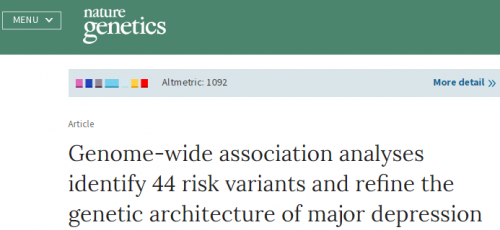Release date: 2018-05-03
Depression is one of the most serious and elusive public health problems in the world, affecting nearly 15% of adults worldwide. Only about half of the patients responded well to existing treatments, including medication and psychotherapy. Recently, a group of scientists said that they have discovered dozens of genes that increase the risk of depression. This finding highlights the complexity of depression and reveals why antidepressant treatment works for some people but is completely ineffective for others.
The researchers first discovered 44 genes associated with depression
On April 26, this large-scale study published in the journal Nature Genetics entitled "Genome-wide associations identifying identify 44 risk variants and refine the genetic architecture of major depression" analyzed more than 135,000 patients with depression. The genome was compared to the genome of nearly 350,000 patients without depression.
The researchers first discovered 44 genes associated with depression

DOI: 10.1038/s41588-018-0090-3
The global coalition of more than 200 scientists identified 44 genetic variants (or small changes in genes), each of which in a tiny way caused a person to be at risk of depression. "Every newly discovered genetic variant is essentially a goal that can be addressed by medication," said Dr. Patrick Sullivan, director of the Center for Mental Genomics at the University of North Carolina School of Medicine.
The study found that many genes associated with depression are also associated with other mental illnesses such as schizophrenia and bipolar disorder, as well as depression-related health problems such as obesity and insomnia. Some of these genetic variants control the neurotransmitters in the brain (such as dopamine and epinephrine), which is the target of current antidepressants; other genetic variants are not related to neurotransmitters, so if some people with depression The genetic basis is elsewhere in the brain, so antidepressants may not work for these people.
It is worth mentioning that the researchers also found that no single gene mutation is a strong risk factor for depression (like BRCA1 mutations often lead to breast cancer), on the contrary, each gene mutation causes depression in an increasing way. Sick.
significance
Early studies of identical twins have shown that half of the depression may be caused by genes, and life stress or trauma is another factor that causes depression. Naomi Wray, the lead author of the study and a professor at the University of Queensland in Australia, said: "Although many life experiences are known to help prevent the risk of depression, identifying genetic factors opens new doors to the study of biological drivers. â€
On the other hand, Sullivan points out that most of the existing antidepressants are accidentally discovered, but now, the development of new drugs can be “reasonably promoted†by these biological discoveries.
Dr. Steven Hyman, director of the Stanley Psychiatric Research Center at MIT and Harvard University (he did not participate in the study) said: "So far, little is known about the biological mechanisms of depression. Research represents an important step in elucidating the biological basis of depression."
Currently, scientists involved in the research are developing an online tool to engage depression volunteers in further genetic research.
Reference materials:
Game-Changing Study Finds Dozens of Genes Tied to Depression
Source: Beijing Daily
Mackerel
Mackerel,King Mackerel,Jack Mackerel,Saba Mackerel
ZHEJIANG EVERNEW SEAFOOD CO.,LTD , https://www.evernewseafood.com